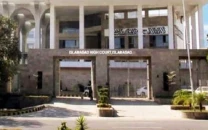The capture of Maulvi Faqir
Hopefully, Faqir’s capture is sign of growing cooperation between the two countries.

There were reports that Faqir was banished from the TTP after he called for peace talks with the Pakistan government at a time when the TTP leadership was opposed to negotiations. PHOTO: AFP/FILE
Hopefully, Faqir’s capture is sign of growing cooperation between the two countries. Previously, the two countries have had to work together, usually with the US as an intermediary, now that the Americans have begun peace talks with the Taliban. Thus Pakistan has been part of the negotiations in Qatar and the release of some high-ranking Afghan Taliban members from Pakistani custody was also the likely result of these peace talks. That does not mean the two countries will continue to get along. There are fears that the Pakistani establishment may be nurturing the Afghan Taliban. If this is true, that means we are yet to give up on our so-called strategic depth policy.
There is also the possibility that Maulvi Faqir’s capture is of less significance than most think. There were reports that Faqir was banished from the TTP after he called for peace talks with the Pakistan government at a time when the TTP leadership was opposed to negotiations. If that happens to be the case, we should still be thankful that this unrepentant murderer is no longer a threat to our country. But we should also be wary of heralding a new era in Pakistan-Afghanistan relations. This may, like with many previous incidents, just be a false dawn.
Published in The Express Tribune, February 21st, 2013.



















COMMENTS
Comments are moderated and generally will be posted if they are on-topic and not abusive.
For more information, please see our Comments FAQ